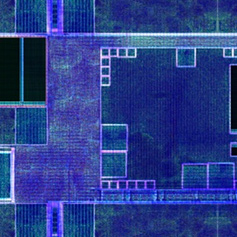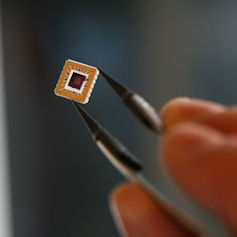
Future computing systems
We are developing novel approaches to processing and computation.
Our facilities
We boast an incredible array of facilities, making our innovative future computing systems research possible.
From our foundations with the world's first stored-program computer, we have grown and expanded with society.
Today our focus is on identifying novel ways to exploit the formidable complexity of the billion transistor microchips that semiconductor technology will make commonplace over the next decade.
Areas of expertise
Our researchers focus their work in the following specialist areas:
-
Advanced processor technologies
From many-core computing to neuromorphic technologies, from adaptive compilers to field programmable gate arrays, we are advancing the state of the art for the next generation of energy-efficient computing hardware.
Read more
-
Nano-engineering and spintronic technologies
We research the physical processes to create the computational and data storage devices of the future, using non-conventional computing media and collaborations with Physicists, Chemists and Materials Scientists.
Read more
-
Systems and software security
We develop state-of-the-art algorithms, methods and protocols to address security and privacy in networked and distributed system environments, and tools to build verifiable, trustworthy software systems.
Read more
Postgraduate research projects
Future computing systems projects
- A Multi-Tenancy FPGA Cloud Infrastructure and Runtime System
- A New Generation of Terahertz Emitters: Exploiting Electron Spin
- Balancing security and privacy with data usefulness and efficiency in wireless sensor networks
- Blockchain-based Local Energy Markets
- Cloud Computing Security
- Design and Exploration of a Memristor-enabled FPGA Architecture
- Design and Implementation of an FPGA-Accelerated Data Analytics Database
- Designing Safe & Explainable Neural Models in NLP
- Dynamic Resource Management for Intelligent Transportation System Applications
- Evaluating Systems for the Augmentation of Human Cognition
- Exploring Unikernel Operating Systems Running on reconfigurable Softcore Processors
- Finding a way through the Fog from the Edge to the Cloud
- Guaranteeing Reliability for IoT Edge Computing Systems
- Hardware Aware Training for AI Systems
- Hybrid Fuzzing Concurrent Software using Model Checking and Machine Learning
- Job and Task Scheduling and Resource Allocation on Parallel/Distributed systems including Cloud, Edge, Fog Computing
- Managing the data deluge for Big Data, Internet-of-Things and/or Industry 4.0 environments
- Pervasive Technology for Multimodal Human Memory Augmentation
- Power Management Methodologies for IoT Edge Devices
- Power Transfer Methods for Inductively Coupled 3-D ICs
- Problems in large graphs representing social networks
- Programmable Mixed-Signal Fabric for Machine Learning Applications
- Scheduling, Resource Management and Decision Making for Cloud / Fog / Edge Computing
- Security and privacy in p2p electricity trading
- Skyrmion-based Electronics
- Skyrmionic Devices for Neuromorphic Computing
- Smart Security for Smart Services in an IoT Context
- Spin waves dynamics for spintronic computational devices
- Technology-driven Human Memory Degradation
- Ultrafast spintronics with synthetic antiferromagnets
Richard Banach projects
Sarah Clinch projects
Lucas Cordeiro projects
- Application Level Verification of Solidity Smart Contracts
- Automated Repair of Deep Neural Networks
- Automatic Detection and Repair of Software Vulnerabilities in Unmanned Aerial Vehicles
- Combining Concolic Testing with Machine Learning to Find Software Vulnerabilities in the Internet of Things
- Designing Safe & Explainable Neural Models in NLP
- Exploiting Software Vulnerabilities at Large Scale
- Finding Vulnerabilities in IoT Software using Fuzzing, Symbolic Execution and Abstract Interpretation
- Hybrid Fuzzing Concurrent Software using Model Checking and Machine Learning
- Using Program Synthesis for Program Repair in IoT Security
- Verification Based Model Extraction Attack and Defence for Deep Neural Networks
- Verifying Cyber-attacks in CUDA Deep Neural Networks for Self-Driving Cars
Andre Freitas projects
Dirk Koch projects
Christoforos Moutafis projects
Mustafa Mustafa projects
Paul Nutter projects
- A New Generation of Terahertz Emitters: Exploiting Electron Spin
- Effective Teaching of Programming: A Detailed Investigation
- Extending Behavioural Algorithmics as a Predictor of Type 1 Diabetes Blood Glucose Highs
- Models of Bio-Sensed Body Temperature and Environment as a Refinement of Type 1 Diabetes Blood Glucose Prediction Algorithmics
- Skyrmionic Devices for Neuromorphic Computing
Pierre Olivier projects
Vasilis Pavlidis projects
Pavlos Petoumenos projects
Oliver Rhodes projects
Rizos Sakellariou projects
- Dynamic Resource Management for Intelligent Transportation System Applications
- Finding a way through the Fog from the Edge to the Cloud
- Job and Task Scheduling and Resource Allocation on Parallel/Distributed systems including Cloud, Edge, Fog Computing
- Managing the data deluge for Big Data, Internet-of-Things and/or Industry 4.0 environments
- Problems in large graphs representing social networks
- Scheduling, Resource Management and Decision Making for Cloud / Fog / Edge Computing




